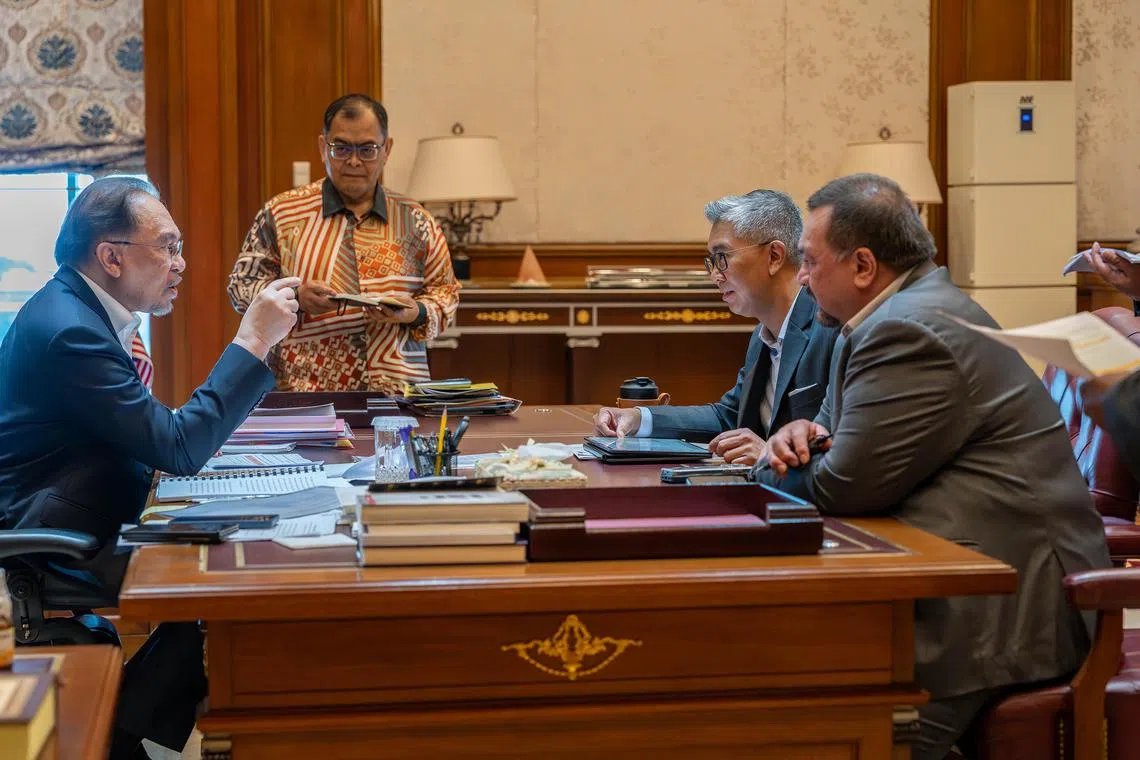Malaysia’s trade minister heading to US, seeks to avert tariff war ‘that benefits none’
Sign up now: Get ST's newsletters delivered to your inbox

Malaysia’s Investment, Trade and Industry Minister Tengku Zafrul Aziz will lead a delegation to Washington on a three-day mission beginning on April 22.
PHOTO: AFP
Follow topic:
KUALA LUMPUR - Malaysia is making haste to minimise the impact of any additional tariffs from the US on not just its own economy but also that of South-east Asia in its role as Asean chair, despite a three-month pause
Investment, Trade and Industry Minister Tengku Zafrul Aziz will lead a delegation to Washington on a three-day mission beginning on April 22 that will include a dialogue with US Trade Representative Jamieson Greer, though a meeting with Secretary of Commerce Howard Lutnick has yet to be confirmed.
While recognising that negotiations with Washington will be a drawn-out affair, he is seeking to understand the US position early, given the July deadline before the tariffs – amounting to 24 per cent on Malaysia – come into force.
“The main aim of this trip is to gather insights into the US government’s stand... to better plan our strategy to mitigate its impact, as well as how to best go forward in negotiations,” Datuk Seri Zafrul told The Straits Times in an interview after returning from Bangkok on April 18.
It “is not possible within the span of such a short trip” to finalise a deal to reduce or abolish the tariffs, he added.
This has also been the experience of Japanese it hopes to conclude talks in 60 days.
America’s April 2 announcement of import levies against all its trading partners
Mr Zafrul’s US trip will come on the back of a series of diplomatic engagements that began with Chinese President Xi Jinping’s three-day visit to Kuala Lumpur
Mr Zafrul will also attend the Johor-Singapore Special Economic Zone (JS-SEZ): Bridging Economies, Strengthening Supply Chains forum in Johor Bahru on April 21, which will see Singapore Deputy Prime Minister Gan Kim Yong deliver a keynote address.
The rush to Washington means that while Mr Zafrul is meeting Mr Greer on April 24, the latter’s assistant for South-east Asia and the Pacific, Ms Sarah Ellerman, will be in Penang meeting top Asean trade officials.
“Our message to the US is clear – we (both Malaysia and Asean) are its significant trading and investment partners. What we want is a win-win scenario for both sides. We are resolute in our stand that a long-drawn tariff war will benefit none,” he said.
Mr Zafrul pointed to how the US was Asean’s largest investor, especially in services such as the finance, insurance, professional, scientific and technical sectors, meaning it “actually has a trade surplus on services with Asean”.
In Washington, he will be joined by Second Finance Minister Amir Hamzah Azizan, who is attending the World Bank and International Monetary Fund spring meetings the same week.

Malaysian PM Anwar Ibrahim’s (left) government will be represented by Investment, Trade and Industry Minister Tengku Zafrul Aziz (second from right) and Finance Minister II Amir Hamzah Azizan (right) during April 24 talks.
PHOTO: MINISTRY OF INVESTMENT, TRADE AND INDUSTRY MALAYSIA
As Asean chair for 2025, Malaysia has also engaged the other nine members of the regional bloc on a joint strategy, including during the recent visit to Thailand.
Mr Zafrul said there is now impetus to deepen trade relations with other key Asean partners such as Japan, India and Australia, and economies in Europe and the Middle East, as “an integral part of our medium- to long-term strategy for developing supply chain resilience”.
The bloc is focusing on upgrading deals such as the Asean-India Trade in Goods Agreement, he added, pointing also to China’s readiness to ink the Asean-China Free Trade Upgrade Protocol.
In the interview, he also noted that the JS-SEZ now has greater significance in helping companies in Johor and Singapore optimise their supply chains against tariff shocks, which industry players in Malaysia say will be crucial in ensuring that the US and China remain viable markets for their products amid a spiralling trade war
Malaysia Semiconductor Industry Association president Wong Siew Hai told ST that the 90-day pause in US tariffs “gives a valuable window for our companies to access where they are, work on their operational resilience, review their supply chain and look at working with their customers and partners” to improve productivity and efficiency.
About 40 per cent of Malaysia’s exports comprise electrical and electronic products, of which a fifth is shipped to the US and almost 15 per cent to China.
“The SEZ will provide platforms for SMEs to integrate into regional and global supply chains,” Mr Zafrul said, referring to small- and medium-sized enterprises that make up over 97 per cent of businesses in the region. “What we want is to create a win-win scenario, leveraging the strengths of both nations, not only for Malaysia and Singapore, but also for Asean.”
On the back of the JS-SEZ initiative, which began with a memorandum of understanding signed with Singapore in January 2024, Johor recorded RM27.4 billion (S$8.14 billion) in investments for the first quarter of 2025, more than six times the amount from a year ago.
Mr Zafrul also stressed the importance of supply chain mapping, with Malaysia focusing on six key sectors: pharmaceuticals, medical devices, electrical and electronics, automotive, food processing, and personal protective equipment.
These are all high-value industries for Malaysia, but also reflect how “the Covid-19 experience significantly enhanced” the understanding of supply chain interdependencies and critical vulnerabilities in essential items.
In August 2024, the National Investment Council, chaired by Prime Minister Anwar, agreed to enhance supply chain management. As such, a National Supply Chain Council is in the process of being established.
This is on top of the Malaysia-Singapore Supply Chain Cooperation Workgroup, as well as the Asean-China Supply Chain Connectivity Chapter aimed at coordinating a cross-border approach to supply chain resilience.
Shannon Teoh is The Straits Times’ bureau chief for Malaysia, where he has reported on various beats since 1998.


